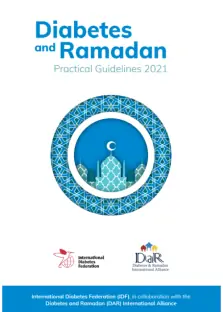Studies have shown that fasting can efficiently reduce type 2 diabetes risk, improve insulin sensitivity, and lower blood pressure.
Before the discovery of insulin, fasting helped manage type 1 diabetes. Today, it supports diagnosing diabetes and risk factor assessment. Additionally, fasting’s potential to reduce and possibly reverse type 2 diabetes is gaining recognition.
Embracing fasting as part of lifestyle changes can lead to better health. Different fasting methods, such as intermittent fasting, offer various benefits. Some research shows that fasting 16 hours of the day and eating within an 8-hour window may help lower blood glucose levels and lose weight in the short term. Furthermore, there is evidence that type 2 diabetes remission is possible by following an intermittent fasting diet.
How fasting works
Fasting works by mobilising glucose and fat for energy. In the first fasting stage, the body mobilises all the glucose for energy. When there is no more glucose for energy, alpha cells in the pancreas produce glucagon and release it in response to a drop in glucose. Glucagon, a hormone produced by the pancreas to regulate blood glucose levels, helps to break down fat, particularly in the pancreas, liver, and visceral areas, creating ketones for energy. The hormone glucagon further elevates the benefits of fasting by preventing glucose levels from dropping too low.
Possible complications from fasting
Although it does have many benefits, fasting is not recommended for everyone. Due to the metabolic nature of the condition, people with diabetes are at particular risk of complications from marked changes in food and liquid intake.
Fasting with diabetes can lead to complications that include:
- Low blood glucose (hypoglycaemia)
- High blood glucose (hyperglycaemia)
- Dehydration
- Diabetic ketoacidosis (DKA), in people with type 1 diabetes
Before starting a fast, it is important to consult a healthcare professional to learn about any associated risks and complications and create a fasting management plan. Discussing medication adjustments and monitoring glucose levels should also be part of the plan.
Diabetes and Ramadan
Fasting (Sawn or Roza) during the holy month of Ramadan is one of the five pillars of Islam and commemorates the time when the Holy Quran was revealed to Prophet Muhhammad (PBUH). The month-long fast, lasting 29-30 days, is obligatory for all healthy Muslims who have reached puberty. Followers must refrain from eating and drinking between dawn and sunset and must abstain from using oral medications, sexual activity and smoking.
Certain groups are exempt from fasting during Ramadan, including some people with chronic conditions like diabetes. Despite potentially being exempt, many people with diabetes choose to fast.
Estimates suggest that there are over 150 million Muslims with diabetes worldwide. Therefore, Ramadan has a major impact on the management of diabetes in the Muslim population.
Before fasting during Ramadan, people with diabetes should consult a healthcare professional to determine if it is safe to fast and develop a diabetes management plan.
Related resources

Diabetes and Ramadan: Practical Guidelines 2021

